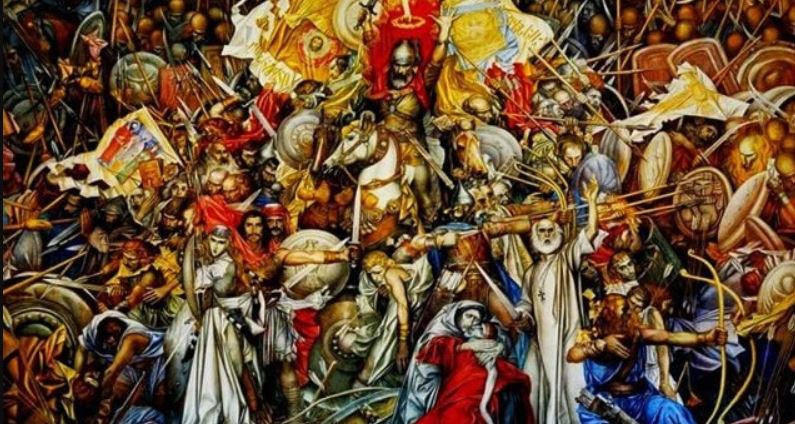Why “Vardanank” was written in 1943 instead of 1937
If we make a solely theoretical assumption that the celebrated Armenian writer Derenik Demirchyan wrote his “Vardanank” novel in the years 1937-38, then he would certainly become a victim of repression. The soviet union government at that time was fighting against “nationalism”, and in case of us, Armenians, they meant not only mentions of the Genocide, but also “worship of Vardan Mamikonyan”. The ban on those two episodes was not accidental: essentially, it was a struggle against the cultural memory, national identity, and at the core of those two were Genocide and Avarayr battle, among other events. Interestingly enough, when thereupon the Genocide, Armenian intelligence, particularly Ervand Otyan and Vrtanes Papazyan, pointed out the need to honor the memory of victims on April the 24th, they drew parallels with Avarayr (“like we celebrate St. Vardanants day”) in order to emphasise the combination of bright and tragic episodes. Perhaps there was a desire to “outweigh” the second with the first.
In the 1920-30s “modernism” excelled “archaism”, and an integral part of the latter was “nationalism”, which was displayed as a negative phenomena. The third most significant element of Armenian national identity is the Armenian Apostolic church (“Chrstianity has been our state religion for 1700 years”). Obviously, a state that “builds communism”, thus implements a strictly modernistic plan, has to cruelly chase the church and clergyman. That attitude lasted until World War 2, when Stalin realized that somewhat tributing to conservatism, mentions of historical past as well as religion can result in the empowerment of the country he ruled. In order to win the war, certain “archaism” is always necessary. (I will note that the terms “modernism” and “archaism” are used in a neutral, not “evaluative” sense).
First of all, Stalin naturally recalled Russian history – Suvorov, Kutuzov, Alexander Nevsky, and returned elements of tsarist outfits to the military uniform. In year 1943 he accepted the officials of the Russian Orthodox church, and in 1945, after conversing with the archbishop of the Armenian Apostolic Church, Gevorg Chorekchyan, he fulfilled all of his main requests, even allowed to hold new elections of the Catholicos(for the first time since 1938), establish church schools, used state money to sponsor the restoration of “Zvartnots” temple etc. In 1943, the first “Vardanank” book was published.
Read also
During the following decades that style of soviet rule remained. “Nationalism” stopped being a crime, even the opposite, a small dose of nationalism was not only permitted, but also encouraged, as long as it did not turn into an idea of national independence. Anti-turkism had to be coupled with pro-Russianism. Sero Khanzadyan, Silva Kaputikyan, Hovhannes Shiraz, Paruyr Sevak brought up a whole generation through their talented work, which rose in 1988 and was able to ensure victory in the first Artsakh war. However the supply of “soviet Armenian” nationalism slowly decreased and it was necessary to come up with a “modernist”(liberal) plan. It was interrupted with the 1998 power change. But this time the prevailing trend was the fake “archaism”, which was nothing more but a “curtain” for an oligarchic system. That system reached its logical conclusion in 2018.
We are now living through the modernism era, where the formal attitude toward the three bases of the national identity (christianity, nominal “Vardanank” and Genocide) is extremely dubious, and following notions like “land”, “belief”, “patriotism” after being consistently put down for the previous two decades, have lost their meanings in public speech. In these conditions, it is impossible to win a war or “resuscitate” those notions artificially. Stalin introduced “archaism” in the conditions of totalitarian regimes, using“force” methods.
We need some time for those notions to rehabilitate. The repetition of cycles makes us suggest that after the change in power (whenever it happens), new losses and disappointments will cause a stricter authoritarian regime to develop, with clear “archaic”, nationalist emphases. It will bad lyaffect us journalists greatly, but you cannot escape from societal patterns.
Aram ABRAHAMYAN
























































